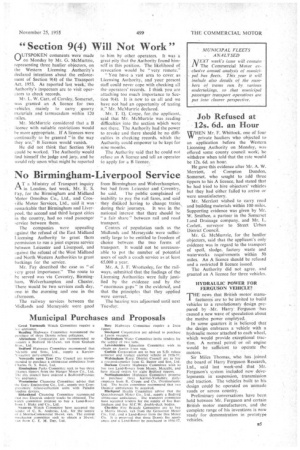No Birmingham-Liverpool Service
Page 39

If you've noticed an error in this article please click here to report it so we can fix it.
AT a Ministry of Transport inquiry in London, last week, Mr. E. S. Fay, for the Birmingham and .Midland Motor Omnibus Co., Ltd., and Crosrifle Motor Services, Ltd., said it was • remarkable that Birmingham and Liverpool, the second and third largest cities iii the country, had no road passenger service between them.
The companies were appealing against the refusal of the East Midland Licensing Authority to grant them permission to run a joint express service between Leicester and Liverpool, and against the refusal of the West Midland and North Western Authorities to grant backings for the service.
Mr. Fay described the case as "of very great importance." The route to he served was via Coventry, Birmingham, Wolverhampton and . Chester. There would be two services each day, onehi the morning and one, in the afternoon.
The railway services between the Midlands and Merseyside were good from Birmingham and Wolverhampton, but had from Leicester and Coventry,
he said. The public complained of inability to pay the rail fares, and said they disliked having to change trains\
during their journeys. It was in the national interest that there should be "a fair share" between rail and road transport.
Centres of population such as the Midlands and Merseyside were sufficiently large to be entitled to freedom of choice between the two forms of transport. It would not be unreasonable to put the number of potential users of such a coach service as at least 65,000 a year.
Mr. A. J. F. Wrottesley, for the railways, submitted that the findings of the Licensing Authorities were fully justified by the evidence and by the "enormous gaps in the evidence, and that the principles that they applied were correct. • • , . .
The hearing was adjourned until next Tuesday:




































































































